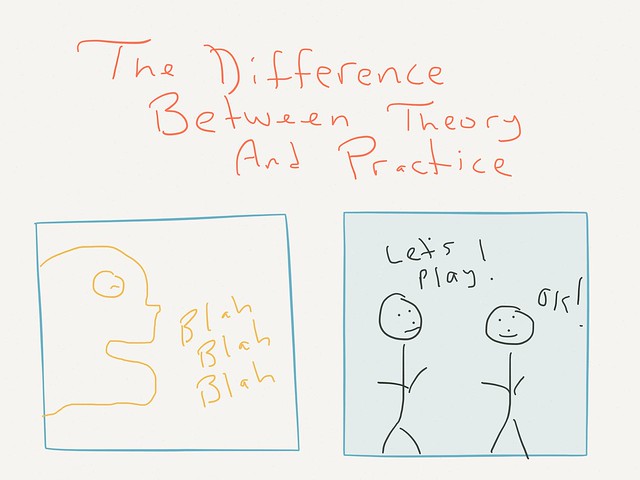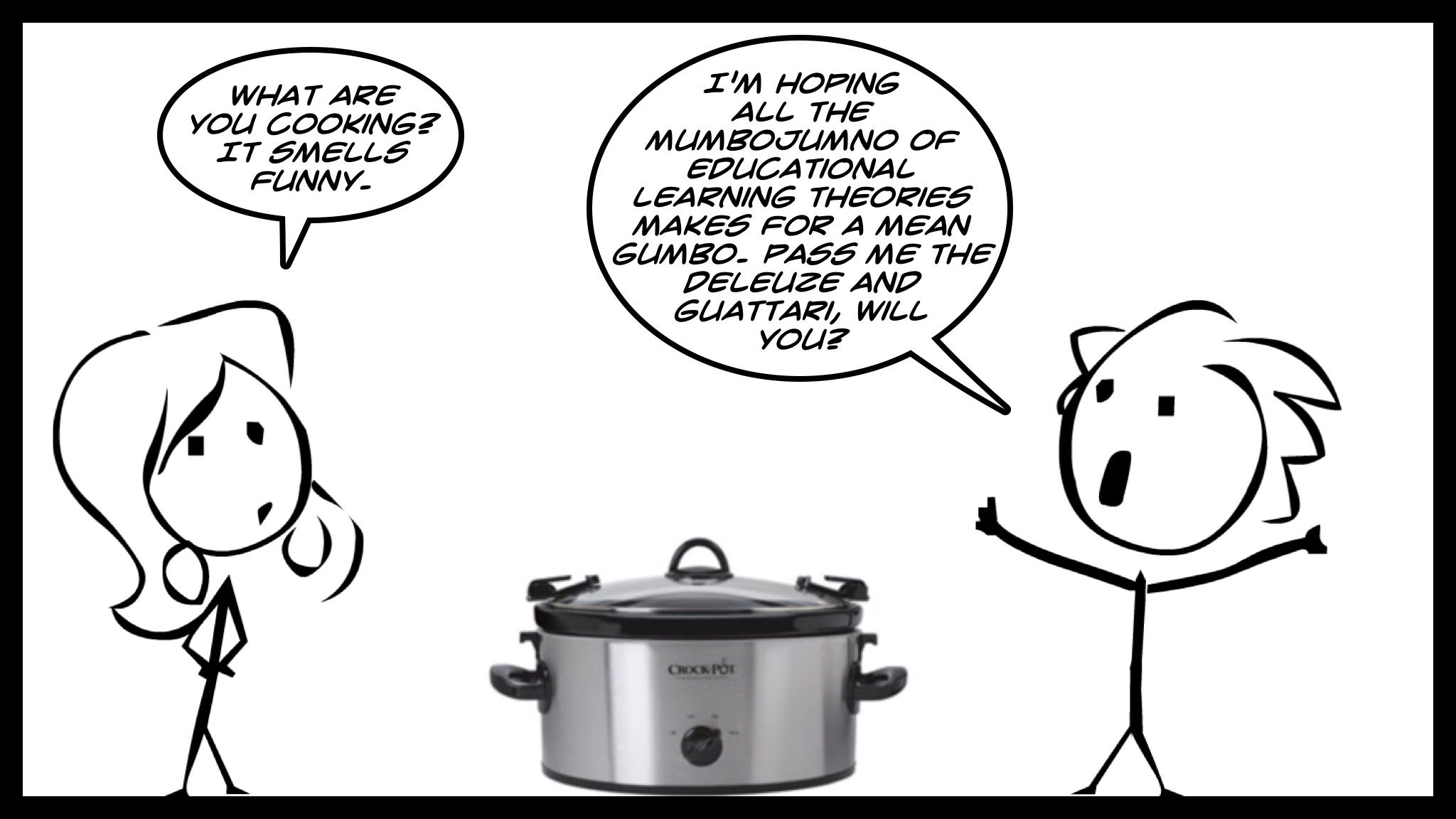I’ll be the first to admit that I don’t quite understand the theoretical or philosophical underpinnings of Rhizomatic Learning, with its grounding in the work of Deleuze and Guattari. Whenever folks in the #rhizo15 community start to reference D&G, my mind sort of begins to wander. I’ve tried to read some of D&G over time, and even enjoyed this artist’s rendition of the first few chapters of A Thousand Plateaus. Tried and got bored. Or lost.
I found this quote, which seems to be a guiding anchor as to why we are even connected D&G to learning ideas in a world in which technology is altering how we read and write and connect and publish and think and network.
… the rhizome pertains to a map that must be produced, constructed, a map that is always detatchable, connectable, reversable, modifiable,, and has multiple entranceways and exits and its own lines of flight.(see Deleuze & Guattari, 1987, p. 21)
But, to be honest, I’ve been more attuned to Dave Cormier’s condensed idea of Rhizomatic Learning in terms of the classroom or network as an ecosystem where ideas spread through shared practice and knowledge, each node connecting to another in a way to help make everyone move ahead in their knowledge and understanding. Or that is my own interpretation of Dave’s interpretation of Rhizomatic Learning. It all dovetails with Connected Learning principles, in a way.
Or so, I believe.
My question for myself is, do I have to fully understand D&G in order to be part of the #rhizo15 experience? Am I just a faker on the outside, tossing comics into the mix like pebbles in the pond? Do I need to be “in” to engage? Will I need to spend a few hours with D&G to feel authentic and valued?
I don’t think so.
I think the #rhizo15 course, so to speak, has been designed by Dave to be open enough that anyone can experience Rhizomatic Learning on their own level, and still be welcomed into the fold. Dave might have certain ideas that spur his own questions to us, but he has never made anyone beholden to the concepts of D&G.
Terry ripped into D&G this weekend, sparking a lot of discussion at his blog site about the use of imprecise language by D&G, and the over-interpretation of theory instead of practice. I like that anyone can freely question the entire architecture of an idea and still be part of the community that grapples with the idea.
Dissent welcome.
Confusion welcome.
Welcome.
Peace (in a bit of a fog today),
Kevin


Good theory is profoundly practical in part because it is predictive and it grounds us. D&G say, I think,(heck, frankly who knows) that we cannot do that. Survival adaptation says we must.
I am not saying theory has to be ultimately predictive, it just has to be helpful. The story of science is in what Karl Popper called falsification. Every theory worth its salt must be falsifiable. What D&G are going for is the falsification of language itself. I think of that as corruption. They are corrupting language and its theoretical underpinnings for their own purposes. Sometimes I think of the Randy Newman lyric when I think of these rhizodudes, “I just want you to hurt like I do. Honest I do, honest I do, honest I do.”
This is what Orwell warned against and what anyone who has been through a fascist takeover like Deleuze had been through in Nazi France would not want–the debasement of communication. Baffling.
Sigh. I am fogged too. Four inches of rain in twenty four hours, sheep wet as sponges, and a green so green it makes me piratical bones claustrophobic.
Ironic anti-spammy goodness: Mr Waster Mr Time Waster once again commented about D&G.
Language is important, as is playing with language. When it seems empty, though, then it’s not always worth the time, Mr Time Waster.
Kevin
I hate lists and labels and taxonomies and hierarchies – I love little incy wincy tiny bits of theory that translate into practice… and a practice of love and connection – which is what I got here anyway.
doing an anti-rain dance for you Terry!
Your anti-rain dance worked! At a little over four inches it stopped. Supposed to have more to day but I trust in your skills as a rain warder. Put that on your CV.
It’s in!! 😀
Rain moved north and is now here. Is this terry rain?
It IS Terry rain – and it followed us all the way to Romania!! Oh boy1
Kevin, I enjoyed reading your post and did so nodding and smiling. Hope nobody was watching. I’ve enjoyed #Rhizo15 but I’m at a point where I have nothing intelligent to say so I just read what other people are saying. Terry says stuff (above) that is so brilliant I’m half entranced and half silenced. I don’t think I’d better read D&G because I might get sucked in without understanding what’s happening. Your definitions/understandings and those you’ve referenced are good enough for me. Love that you throw out comics like confetti. Always enjoyable to read and think about.
Comics as Confetti .. that is the title of something cool somewhere.
Thanks
Kevin
Dunno, dude, the only way I know how to make confetti these days is to do some industrial strength shredding.
Tania is such an ironic rascal–says something brilliant while saying she knows nothing. Our Socrates. The moment you stop being brilliant I will sit up and take notice.
Haha, Terry. I don’t know what you’re talking about.
Hi Tania, Can so relate to that “just read what other people are saying”….that’s about where I’m at…but still engaged and enjoying the discussions and posts. thanks kevin for all posts.
Hi Wendy, I was feeling slightly bad about that for a while but then I got over it and just enjoy everybody’s creativity and ideas.
Without the comics and humour, and my favourite contributions have been those visual contributions, many of them yours Kevin and how they bounce off other people and make their own energy. I don’t think I would have stayed without the comics. It’s not that I’m not interested in theory, but I don’t have time when I’m at work when my head is in education to contribute in that context. I read and write posts when I’m cooking or between snatches of real world interaction. 5 mins here and there. My contributions are honestly never going to be deep, heavily referenced or sparked by referring back to theory. I just ramble what I’m thinking, and in many ways, I’m just writing a learning journal for myself, hardly shareable really.
So, thank you for the comics – you will probably never know how many of us have stayed around because of them – but I’m sure I’m not the only one. 😉
Such kind words. I am grateful, Angela.
Thanks
Kevin
I don’t think that you need to read D&G in order to be part of #rhizo15. I’d say that you are pretty central to it, and that your comics do a lot to explain this whole experience.
Perhaps we have just absorbed D&G from each other.
Both Tania and Kevin have hit upon the my feelings about #Rhizo15 that I haven’t wanted to admit. I will not be reading D&G any time soon, and I don’t think I even realized for awhile what the connection was between D&G and #Rhizo15. I find the discussions fascinating (and hard to keep up with) and I will be a lurker, for the most part!
i think this is one of the most interesting questions about D & G and rhizomatic theory – particularly in terms of capitalism and all that is derived from it… i’m kind of fascinated by the use of rhizomatic theory in management and organizational psychology – can the tools of subversion be used to prop up the dominating classes? and it seems to me that in their ideas of territorialisation, de-territorialisation, re-territorialisation they are predicting this future (this now-time) from when they were writing. like, it’s interesting there is no group for reading Dewey that strews out comics like confetti… or poems… or songs…
or is there?